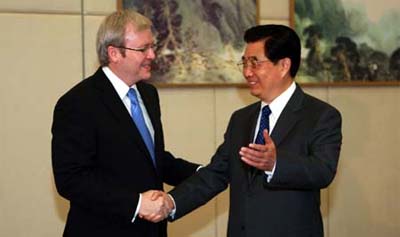I have a whole range of dealings with China on a daily basis. They include banking, media investment, machinery sales and servicing and public policy issues.
In dealing with China, we must be guided by national interests. It is perhaps instructive to quote from the greatest strategist of all time, ‘know thyself and know thy enemy, you shall be invincible.’ China is a formidable partner to deal with; it has 3000 years of highly centralised and elitist administrative culture coupled with a Maoist determination to be free from foreign ownership and control over China’s resources. The current leadership has not deviated much from that outlook.
China is not a series of fiefdoms – it is a collectivist system. China’s recent 5 year plan pull forward revealed the biggest stimulus in world history and this highlighted the Chinese government’s capacity to respond.
The recent failed bid by Chinaclo to acquire a significant stake in Rio Tinto highlighted the determination and the goal of the Chinese government to extend its influence over strategic resources. The former head of Chinalco who had organised the earlier raid on Rio Tinto shares in London through an open market operation was promoted to a coveted position as a Vice-Minister of the State Council.
The bid was clearly designed to obstruct the proposed union between two mining giants BHP and Rio Rinto. The later effort to acquire a chunk of Rio Tinto and its key assets failed due to shareholders’ reaction: the rest is history.
This represented a huge loss of face for Beijing and a significant setback for China’s ‘going out’ strategy.
The six principles announced by Treasurer Wayne Swan were widely viewed by the Chinese investors as directed against them. The principle that requires approval by the Foreign Investment Review Board (FIRB) of incoming investment by state entities seems to be targeted against inbound Chinese investment, although it is not the case at all.
The Chinese became agitated over the setback and attributed part of the blame of the failed Chinaclo bid to the non-support and interference from the Australian government.
The earlier intimacy towards Rudd has gradually eroded in Beijing. The Chinese believe that Rudd often ‘double spoke’ to cultivate an image of a Sinophile, yet his actions were perceived as frustrating Chinese interests.
The Defence White Paper’s thinly veiled message that China is Australia’s biggest national security threat was further proof of Rudd’s hostile attitude towards China.
It is clear that China is taking a harder line on its grand ‘going out’ strategy and domestic growth. China is keen to flex its financial muscle through its massive US$ 2 trillion dollar war chest to acquire vital strategic resources to fuel its breakneck growth.
The Chinese are determined that the earlier humiliations suffered in the United States and Australia (namely, the failed CNOOC and Chinalco bids) would not be repeated.
One of the key planks of their domestic policy is to reassert order in the highly fragmented and chaotic domestic steel and iron ore markets. The increase in the price of steel products weighed heavily on other end users in China and the government has been determined to right that wrong.
The arrest of Stern Hu could be seen as part of broader effort to address that problem.
So, how do we address these pressing issues?
First, we need a coherent and bipartisan approach to the management of our critical relationship with China. The often strident and obtrusive coalition opposition is complicating the already fractious relationship. The kind of populist and megaphone stunts performed by the opposition has exerted unhelpful pressure on the conduct of bilateral dealings.
What we need right now is quiet behind the door diplomacy that would see Stern Hu released without public fanfare and without charges.
Second, the Prime Minster needs to balance his approach to China. He needs to vigorously advocate for Australian national interests on one hand, yet simultaneously preserve an amicable rapport on the other.
Warwick Smith AM is currently Chairman of ANZ (NSW / ACT). He was a minister in the Howard government and is an alumnus of the ANU.
This article is a digest of a speech delivered at the ANU.

